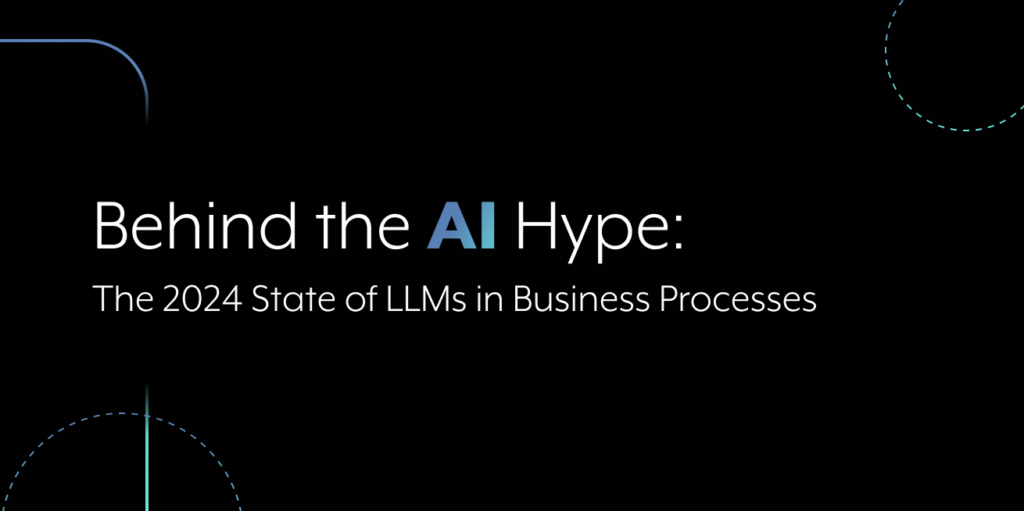In today’s rapidly evolving digital landscape, enterprises find themselves at a crossroads. The advent of generative AI offers unprecedented opportunities for transformation, but with it comes a sobering reality: in this AI arms race, standing still is equivalent to falling behind.
Market sentiment about generative AI has entered a new era. Early hype is fading—and business leaders have a clearer view of its strengths and challenges.
In a new study published by Workato, 90% of organizations are actively experimenting with AI to gain measurable business outcomes. With such involvement, 89% report notable results across processes, underscoring AI’s critical role in shaping tomorrow’s business environment.

For Enterprise Architects, navigating this landscape requires a strategic approach. The study reveals three key requirements for success in large organizations where complexity is high and the margin for error is zero when it comes to realizing real value in a true AI transformation:
- Building trust through governance
- Human-in-the-loop collaboration
- API-driven strategies at a core company level
Let’s explore these findings from the 2024 State of LLMs in Business Processes and discuss the formula for success that’s paramount for the world’s largest global firms in the coming years.
1. Building Trust through Governance
In enterprises where complexity and scale are the norm, the deployment of AI necessitates a meticulous approach to governance. Effective AI strategies are built on a foundation of robust governance frameworks—addressing critical concerns such as data privacy, ethical use, and systemic transparency.

Survey insights reveal governance as the top prerequisite for building trust in AI systems. More than 94% of leaders emphasize the importance of governance to ensure reliability and accuracy in AI operations. This approach reflects an understanding that governance isn’t merely a safeguard; it’s a strategic asset that enhances AI’s potential across the enterprise.

For Enterprise Architects, implementing AI governance means:
- Establishing clear data management protocols to ensure AI systems access only approved, high-quality data
- Designing audit trails and explainability mechanisms for AI decisions
- Creating cross-functional teams to oversee AI implementation and usage across the organization
Dr. Massimo Pezzini’s insights echo this sentiment: “An enterprise-wide AI strategy is rare, yet essential.” This signals a shift towards viewing AI governance as central to corporate strategy, guiding its integration into business processes while ensuring alignment with organizational values and risk profiles.
2. Enhancing Human and AI Collaboration
The true value of AI in a large enterprise context arises when human expertise complements AI’s capabilities. This collaboration is key to unlocking AI’s full potential, driving informed decision-making, and fostering innovation. The survey highlights a significant trend: enterprises leverage AI not to replace, but to amplify the capabilities of their skilled workforce.


This synergy is crucial in environments where strategic decisions and nuanced insights are paramount. By keeping experts involved in AI processes, organizations ensure that AI actions align with broader business objectives. This collaboration exemplifies how AI, when strategically integrated, serves as a catalyst for enhanced operational performance, agility, and innovation.
Earl Newsome, CIO of Cummins Inc., emphasizes this point: “AI has some challenges. It can be wrong, it can hallucinate, it can use copyrighted materials, it can be biased. The antidote is to put a human in the loop. If we are thinking of collaborative AI, and thriving with AI, the human in the loop becomes a necessary part of that equation.”

3. Strategic Integration through APIs
Achieving meaningful AI integration in large enterprises requires a strategic, interconnected approach. APIs play an instrumental role, acting as the conduit through which AI’s capabilities are woven into the organizational fabric—enhancing existing systems and processes.

The preference for API-driven AI deployment, cited by nearly 48% of business leaders in the survey, underscores its importance in executing a cohesive AI strategy. APIs facilitate seamless interaction between diverse business systems, ensuring that AI initiatives are not siloed but integrated horizontally across departments.

For Enterprise Architects, this means:
- Designing a robust API strategy that allows for easy integration of AI services across the enterprise
- Implementing API management tools to ensure security, scalability, and performance
- Creating standardized interfaces for AI services to promote reusability and reduce development time
This approach allows enterprises to harness AI’s transformative potential, driving improvements in efficiency, response times, and decision-making processes. By embedding AI into an enterprise’s core systems through APIs, organizations are better positioned to foster innovation, adaptability, and sustained competitive advantage.

“I haven’t seen many organizations put together an enterprise-wide AI strategy. Most of them are still experimenting with AI tactically or opportunistically.”
Massimo Pezzini, Head of Research, Future of the Enterprise, Workato
The Role of Enterprise Architecture in AI Adoption
As the orchestrators of enterprise technology strategy, Enterprise Architects play a crucial role in successful AI adoption:
| Where to focus today: | Trends to prepare for: |
| 1.) Build an AI roadmap that allows for iteration/agility as technology evolves. 2.) Prioritize flexible and resilient platforms over fragile legacy technology to adapt quickly without disrupting existing systems. 3.) Transition from legacy platforms that may hinder AI adoption and adaptability. 4.) Map AI capabilities across the entire business, avoiding isolated, app-specific implementations. 5.) Prepare for increased demand in data orchestration as part of integration and automation processes. | 1.) AI agents executing complex workflows, requiring platforms that dynamically orchestrate multi-step processes. 2.) Increased demand for real-time decision making, necessitating swift data processing and action. 3.) Growing importance of explainable AI, driving the need for transparent, easily auditable processes. 4.) Industry-specific AI models: Evaluate their relevance and potential overlap with existing systems. |
From insights to action: What’s next?
Our survey reveals that enterprise AI success hinges on three critical factors: thoughtful integration strategies, robust governance, and effective human-AI collaboration. When aligned with business objectives, these elements drive significant performance and innovation gains.
The trick is building a system that’s flexible enough to handle these needs while keeping up with AI’s rapid evolution. You’ll want platforms that can integrate seamlessly, govern effectively, and support true collaboration.
Ready to take the next step?
- See Real Solutions in Action:
- Find out how other companies are tackling AI challenges head-on by booking a demo.
- Get the Full Picture:
- Dive into our “2024 State of LLMs in Business Processes” report for the latest on AI’s impact.
Whether you’re facing specific hurdles or just want to stay ahead of the curve, we’re here to help you make AI work for your business. Let’s get started.

